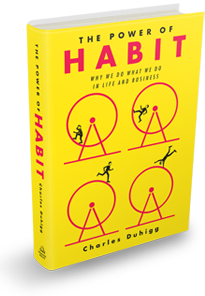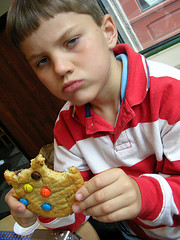I could write a book about Charles Duhigg’s best-selling book called The Power of Habit… but I won’t because I could never do it any justice. Suffice it to say I recommend this best seller and that I found it loaded with insights that are applicable to all professions and to “real life” as well.
But there was one research experiment delineated in the book that I found particularly relevant and helpful, so I will briefly blog about it. The experiment was designed to shed light on how human willpower works. Mark Muraven, a professor at the University of Albany, put two groups of college students in two separate rooms with some freshly baked cookies.
In the first room, the students were treated very nicely and gently asked to “please don’t eat the cookies.” This group was also encouraged to provide any suggestions to the researchers on how to improve the experiment.
The second room of students was not treated nicely. Students were ordered in short, terse tones “not to eat the cookies.” They were not given any indication of encouragement or interest in hearing their feedback.
Both groups successfully avoided eating the cookies for the duration of that portion of the experiment, five minutes. Both groups and all students were then presented with a 12-minute computer challenge, designed to measure “willpower.”
The group of students that were politely and kindly asked to avoid eating the cookies scored very well on the challenge. The students who were ordered and treated unkindly performed very poorly. Muraven’s conclusions:
“When people are asked to do something that takes self-control, if they think they are doing it for personal reasons – if they feel like it’s a choice or something they enjoy because it helps someone else – it’s much less taxing. If they feel like they have no autonomy, if they are just following orders, their willpower muscles get tired much faster… But when the students were treated like cogs, rather than people, it took a lot more willpower.”
I loved Duhigg’s analysis of the findings as well:
“For companies and organizations, this insight has enormous implications. Simply giving employees a sense of agency – a feeling that they are in control, that they have genuine decision-making authority – can radically increase how much energy and focus they bring to their jobs.”
These findings really struck a cord with me. It explains why I find it so difficult to respond in a motivated fashion when I feel as if I’m being summoned or ordered to do something and my thoughts don’t matter. It explains why my children resist and ignore me when I am “barking orders” to them to pick up their rooms or clean up the kitchen.
It also makes me much more cognizant of why some leaders are so inspiring, and others are not. It made me think about marketing approaches and strategies that truly empower an audience to learn more and decide for themselves which service or product to buy. Those are the strategies and personal treatment that will be the most sustainable over the long term.
Duhigg makes a strong case that human “willpower” is a muscle – one that can be strengthened and weakened as much as the biceps, for example. As marketers, indeed and as human beings, we can do so much better by thinking about what and how much we are asking of our willpower.




